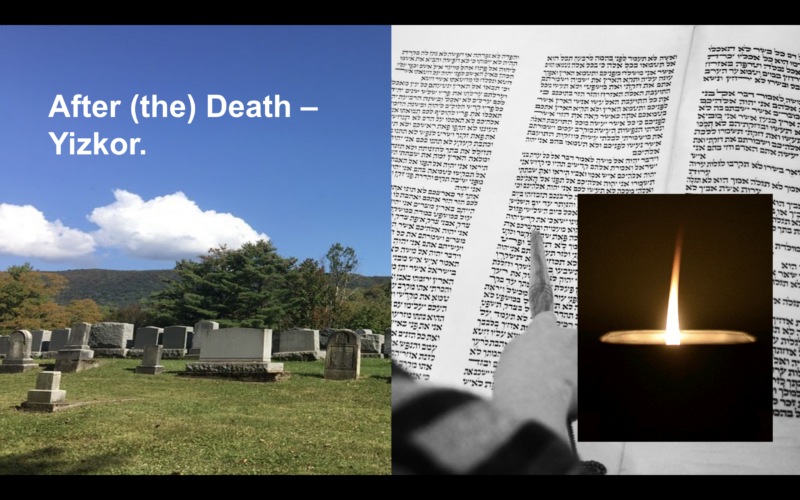
We’re in a slightly strange position today, spiritually speaking. We are a Reform congregation, and in the Reform world, Pesach is a seven-day festival — as it is in Israel for Jews of all denominations. Today is no longer Pesach; it’s “just” Shabbat, like any other Shabbat.
And yet we’re saying the Yizkor memorial prayers today, which is a thing we do at the end of Pesach. We could have held a special service for the seventh day of Pesach and recited Yizkor yesterday, but most of us don’t have the practice of taking off work for 7th day chag.
So here we are, preparing for Yizkor even though it isn’t Pesach for us. This year, maybe because I am myself a mourner, I noticed something about the confluence of Yizkor and the Torah portion we read today, the first part of Acharei Mot, “After the Death.”
The death in question is that of Aaron’s two sons, who died after bringing “strange fire” before God. At the moment of their death, Torah tells us, Aaron was silent. Sometimes, loss can steal our ability even to speak. We have no words, because in that moment there are no words to have.
After the death of Aaron’s sons, God tells Moses to tell Aaron not to come “at will” into the Holy of Holies, because God’s presence there is so powerful that Aaron might die. Instead, Torah outlines a set of practices: here are the garments to wear, the offerings to bring, in order to be safe.
In Torah’s paradigm, direct unmediated experience of God is dangerous. (That’s why when Moshe asks to see God’s glory, God covers him in the cleft of a rock face and passes by, and Moshe only gets to witness the divine Afterimage.) The rituals of sacrifice made contact with God safe.
Grief and loss can overwhelm us, even blow out our regular spiritual circuits. And they’re meant to. This is what it means to be human: to love, and to lose. Our tradition’s mourning rituals provide structure, telling us when to stay home and when to emerge, and when to give ourselves space to remember.
Reciting the Yizkor prayers four times a year gives a predictable rhythm to the ebb and flow of mourning. The prayers are the same, whether at Yom Kippur or Shemini Atzeret or Pesach or Shavuot, but the way we feel saying them might change over the course of the year — or from year to year.
A loss that’s brand-new can be raw and overwhelming, can steal our words and our breath. A loss that’s decades old might feel familiar, more like a broken bone long-ago healed than like a stab wound. Yizkor carries us through from new sharp loss to old familiar recollection.
That shift might take years, and there’s no way to rush it. Grief takes the time it takes, and we feel what we feel, and eventually the sharp edges become gentler. Saying Yizkor four times a year is our spiritual technology for plugging in to our losses in community in a way that’s safe.
Suddenly it feels exactly right to me that this year’s end-of-Pesach Yizkor coincides with reading this first part of Acharei Mot. Like Aaron, we are faced with the question of how to make meaning after loss… and how to feel everything we need to feel while also functioning in the world.
Aaron relied on ritual to safely enter behind the curtain into the place where God’s presence was most palpable. And we rely on ritual in our practice of Yizkor, the words we pray as we remember our dead. This too is a kind of going-behind-the-curtain into direct personal encounter.
Even if you don’t typically wear a tallit for prayer, I invite you to pick one up as we begin Yizkor. Wrap yourself in it; maybe it feels like an embrace. And when we enter into silence, go behind the curtain of your tallit and take some time to connect with memory and with those whom you’ve lost.
May our prayers and our song and our silence be a safe container for whatever each of us needs to feel. May this ancient practice hold us up and help us through. And may we emerge from today’s encounter with loss and memory feeling present and whole, and sanctified, and not alone.
This is Rabbi Rachel’s d’varling from Shabbat morning services (cross-posted to Velveteen Rabbi.)





